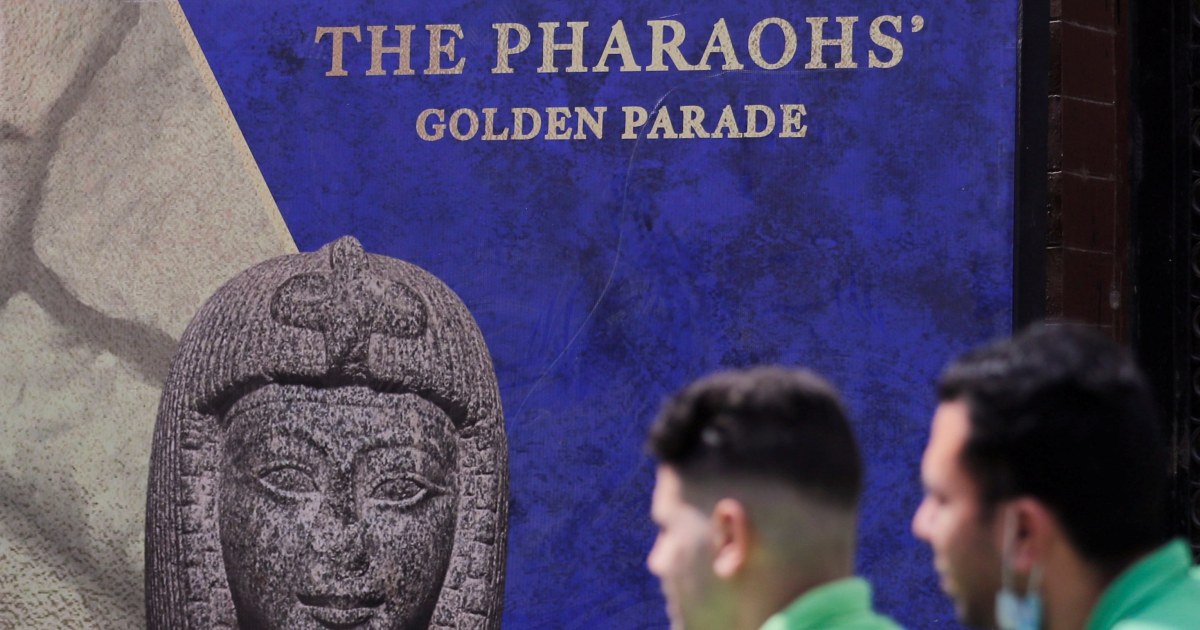CAIRO – Some are blaming the “curse of the pharaohs” for a series of unfortunate incidents in Egypt in recent weeks, including the giant ship that blocked the Suez Canal for about a week, until it was released on Monday.
Still, many were expected to turn on their TVs for the grand parade of 22 ancient Egyptian royal mummies as they were moved through the capital, Cairo, on Saturday. Authorities urged people to stay off the streets because of restrictions on coronavirus.
Authorities closed roads along the Nile for the elaborate royal procession called the Golden Parade, designed to spark interest in the North African country’s rich collections of antiquities when tourism was almost completely paralyzed because of the coronavirus pandemic.
The convoy transported 18 kings and four queens, most of them from the old New Empire era, in vehicles with specially designed shock absorbers and capsules filled with nitrogen to ensure their protection.
National treasures traveled about 3 miles from the Egyptian Museum, opened in 1902 at Tahrir Square in central Cairo, to their new home at the National Museum of Egyptian Civilization in Fustat – the site of Egypt’s capital under the Umayyad dynasty after the conquest Arabic.
Moving the mummies rekindled conversations about a pharaoh’s curse, especially on social media, after the ship blocked the Suez Canal, a train accident killed dozens last month and a building collapsed in central Cairo.
“Death will come with quick wings for those who disturb the king’s peace,” read the warning on Tutankhamen’s tomb, before British archaeologist Howard Carter opened it in 1922.
The members of his expedition later succumbed to strange accidents and death, fueling the myth of the curse, although archaeologists and scientists now say that they are probably linked to exposure to dust and germs in sealed caves.
Egyptian archaeologist Zahi Hawass rejected the rumors.
“Before the mummies were walking on the streets of Cairo today, things happened in Egypt: the boat in the Suez Canal, the trains also had an accident and a building collapsed. Everyone says this is the curse of the mummy, but I say there is no curse for the mummy, “he told NBC News.” The curse is good for TV, movies and newspapers, but it is not true. There is no curse. “
Instead, Hawass said that foreign residents and tourists will be able to see for themselves the “secrets” kept by each mummy as soon as they are on display.
“The parade is very important not only for Egypt, but for the whole world because 22 kings will walk the streets of Cairo like magic,” he added.
Download the NBC News app for breaking news and politics
Archeologists discovered the mummies in two plots in 1881 and 1898 at the Deir Al Bahari mortuary temple complex in Luxor and in the neighboring Valley of the Kings.
The oldest mummy in the group is that of King Seqenenre Tao, the last king of the 17th Dynasty, who reigned in the 16th century BC and is believed to have died a violent death.
The parade will also feature mummies from Ramses II, Seti I and Queen Ahmose-Nefertari, responsible for military expeditions, trade networks and the construction of vast monuments and artistic creations.
“In doing so, with great pomp and circumstance, the mummies are getting what they deserve,” Salima Ikram, an Egyptologist at the American University in Cairo, told Reuters. “These are the kings of Egypt, these are the pharaohs. And therefore, it is a way of showing respect.”
Charlene Gubash reported from Cairo and Adela Suliman from London.
Raf Sanchez and Reuters contributed.


